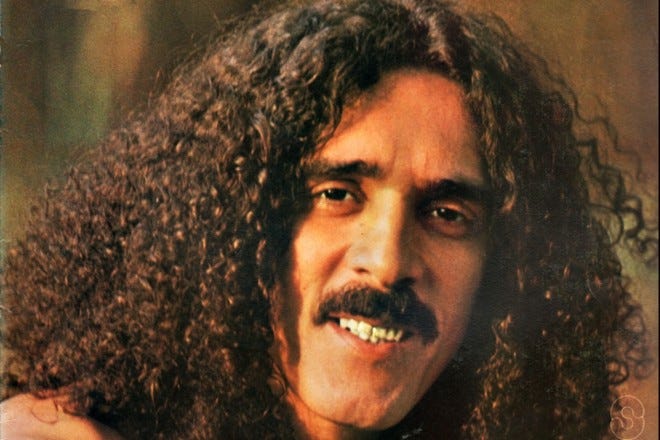Alto Falante: Moraes Moreira in the 1970s
Examining the beginnings of the former Os Novos Baianos front man's solo career
Antônio Carlos Moreira Pires was born July 8th, 1947 in Ituaçu, Bahia in Brazil. Though he would become known as a guitarist and singer his first instrument was the accordion which he abandoned after picking up a guitar. He moved to Salvador to attend medical school and there met future Tropicalist Tom Zé. When Moraes mentioned that he was writing songs Zé offered to give him guitar lessons. At the same time he met writer Luís Galvão. They shared an apartment and began writing songs together. He also met singers Bernadete Dinorah de Carvalho Cidade and Paulo Roberto Figueiredo de Oliveira who would become known and Baby Consuelo and Paulinho Boca de Cantor. Together the four would start the band Os Novos Baianos soon adding guitarist Pepeu Gomes and drummer Jorginho Gomes and recorded their debut album É Ferro na Boneca (Iron Doll) in 1970. The album was deeply indebted to the psychedelic pan-culturalism of Tropicalia but lacked the Brazilian folk elements that would come to set their work apart. Moraes and Galvao wrote all but one song.
The group holed up together in Rio De Janeiro, living communally and rehearsing and writing constantly. One evening a well-dressed man with a guitar case showed up at their door. The bass player Dadi answered and fearing it was the police would not let him in. The man was Bossa Nova legend Joao Gilberto. After his identity was cleared up they cleaned out a closet and set up a makeshift stage where Gilberto sang and played into the morning. He encouraged the band to use more Brazilian folk elements such as choro, samba and baião, styles familiar to them from their homes in the north-east of Brazil. It was the beginning of a life-long friendship between Moraes and Gilberto and we will see more fruit borne of that relationship on Moraes’ last album of the 70s, Lá Vem o Brasil Descendo a Ladeira.
With these new folk influences folded into their psychedelic rock Os Novos Baianos created what is widely considered one of the greatest albums in Brazil’s history, Acabou Chorare (The Crying is Over). Moraes and Galvão again did most of the writing. They would make a further three albums with Os Novos Baianos, Novos Baianos F.C., Novos Baianos and Vamos Pro Mundo after which Moraes would make the difficult decision leave the band’s farm in Sao Paolo and the band itself feeling that with his two children it was time strike out on his own.
He began to get back in touch with the music of his home in the hinterlands of north-east Brazil, especially that of Carnaval. He began singing with the trio elétrico (then just a car or bus fitted with loudspeakers but now a massive truck-pulled stage and light show) of Dodô e Osmar, the inventors of the trio as well as the guitarra baiana, a small, high-tuned guitar not unlike cavaquinho. Moraes would make the album Jubileu de Prata (Silver Jubilee) with Dodô e Osmar and guitarra baiana virtuoso Armandinho. For Moraes’ 1975 self-titled debut album he would bring Armandinho along with him as well as Baianos bassist Dadi. The album is a blend of prog-rock, samba, choro, bossa nova and MPB (Musica Popular Brasileira). His next album Cara e Coração (Face and Heart) from 1977 leaned more heavily into Nordestino music especially on Pombo Correio (Carrier Pigeon). Originally an instrumental by Dodô e Osmar written in 1950 it was fitted with lyrics by Moraes and became his first big hit. The album also includes the beautiful xote Hino Nordestino written for his son Davi and the bossa nova of the title track. Alto Falante (Loudspeaker) would come out in 1978 and continue much in the same vein as the previous album yielding the hit Crioula.
In 1978 Moraes went on a walk in Sao Paolo with Joao Gilberto late one night. As the sun was coming up they spotted a woman carrying a pot of water down the hill. Gilberto said “Look, there is Brazil descending the hill.” Moraes began composing the song in his head almost instantly. It would become the title track of 1979’s Lá Vem o Brasil Descendo a Ladeira (Here Comes Brazil Descending the Hill), a hit record and one of the greatest Brazilian albums of the 1970s. It fleshed out the traditional Brazilian styles and “frevo trieletrizado” he had been working with on previous albums with more elaborate arrangements featuring strings and brass.
By the end of the 70s Moraes Moreira had carved a solo career out for himself as one of Brazil’s most important singers and songwriters. In the next decades he would continue to mine his northeastern culture and put out great records up until his passing on April 13th of 2020.
Here’s a playlist of tracks from Moraes’ 70s solo albums.




